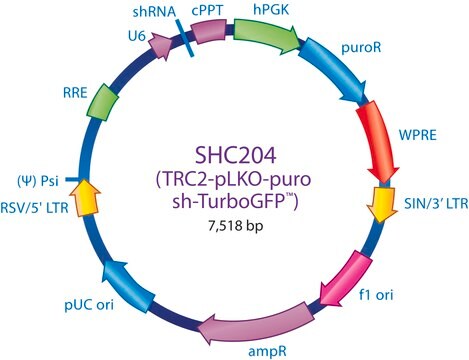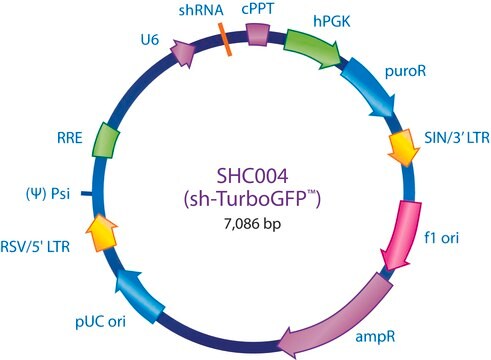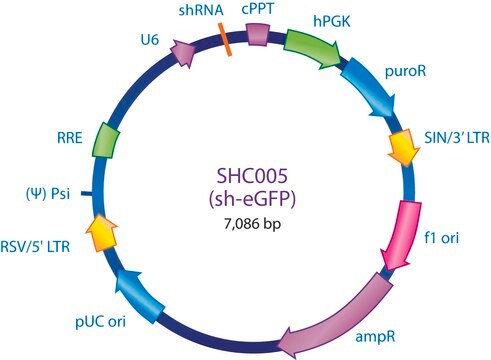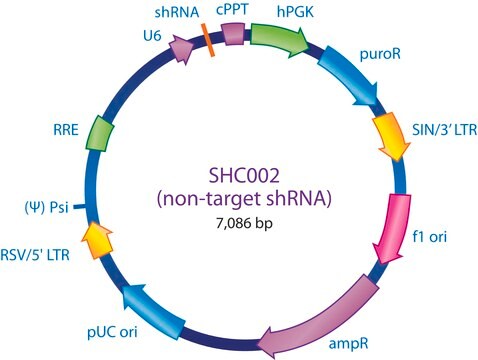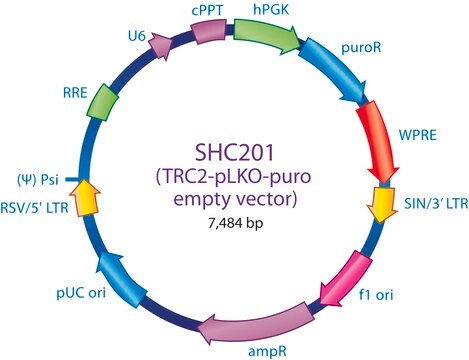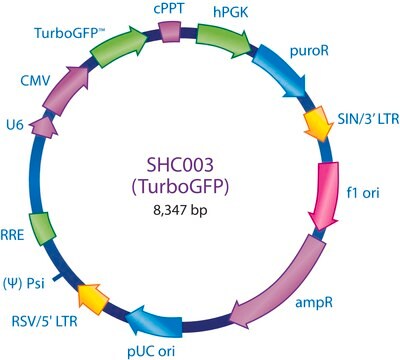おすすめの製品
製品種目
MISSION®
品質水準
品質
shRNA sequence targeting tGFP
濃度
≥1x106 VP/ml (via p24 assay)
輸送温度
dry ice
保管温度
−70°C
類似した製品をお探しですか? 訪問 製品比較ガイド
関連するカテゴリー
詳細
MISSION® shRNAクローンを用いた実験を行う際には、ノックダウン結果を正確に解釈するために、実験計画において適切なコントロールを選択することが重要です。The MISSION Control Transduction Particleは、トランスダクション効率をモニターするための重要なポジティブコントロールです。
アプリケーションデータ、プロトコール、ベクターマップの詳細は、sigma.com/shrnaをご覧ください。
アプリケーションデータ、プロトコール、ベクターマップの詳細は、sigma.com/shrnaをご覧ください。
The MISSION TRC2 TurboGFP shRNA Control Transduction Particles contain an shRNA sequence targeting TurboGFP. This control is produced from the sequence-verified lentiviral plasmid, TRC2 pLKO-puro TurboGFP shRNA (SHC204). The TurboGFP shRNA Control Particles are useful as a positive knockdown control in experiments using the MISSION TurboGFP positive control vector or in cell lines expressing TurboGFP. TurboGFP is an improved variant of the green fluorescent protein copGFP cloned from copepoda Pontellina plumata.
Unlike murine-based MMLV or MSCV retroviral systems, lentiviral-based particles permit efficient infection and integration of the construct into differentiated and non-dividing cells, such as neurons and dendritic cells, overcoming low transfection and integration difficulties when using these cell lines. Self-inactivating replication incompetent viral particles are produced in packaging cells (HEK293T) by co-transfection with compatible packaging plasmids.
In addition, the lentiviral transduction particles are pseudotyped with an envelope G glycoprotein from Vesicular Stomatitis Virus (VSV-G), allowing transduction of a wide variety of mammalian cells. 200 μl of 106 TU/ml (via p24 titering assay) lentiviral particles are provided as frozen stock.
When conducting experiments using MISSION shRNA clones, the proper controls should be a key element of your experimental design to allow for accurate interpretation of knockdown results.
Unlike murine-based MMLV or MSCV retroviral systems, lentiviral-based particles permit efficient infection and integration of the construct into differentiated and non-dividing cells, such as neurons and dendritic cells, overcoming low transfection and integration difficulties when using these cell lines. Self-inactivating replication incompetent viral particles are produced in packaging cells (HEK293T) by co-transfection with compatible packaging plasmids.
In addition, the lentiviral transduction particles are pseudotyped with an envelope G glycoprotein from Vesicular Stomatitis Virus (VSV-G), allowing transduction of a wide variety of mammalian cells. 200 μl of 106 TU/ml (via p24 titering assay) lentiviral particles are provided as frozen stock.
When conducting experiments using MISSION shRNA clones, the proper controls should be a key element of your experimental design to allow for accurate interpretation of knockdown results.
アプリケーション
ELISA捕捉:106 TU/mL(p24)
アプリケーションデータ、プロトコール、ベクターマップ等の詳細はこちらをご覧ください。
ショートヘアピンRNA(shRNA)から生じる低分子干渉RNA(siRNA)は、哺乳類細胞における遺伝子特異的なRNA干渉(RNAi)を引き起こす有力な方法です。MISSION™シリーズは、アノテーションされたマウス、ヒト遺伝子に対するウイルスベクターを使用したRNAiライブラリーです。細胞内でsiRNAを生じるshRNAは広宿主性のレンチウイルス粒子から発現され、広範囲の哺乳類細胞株でスクリーニングが可能です。これらの細胞株において、MISSION shRNAクローンは迅速かつコスト効率の良い機能喪失と遺伝子相互作用のスクリーニングを可能にします。
法的情報
MISSION is a registered trademark of Merck KGaA, Darmstadt, Germany
TurboGFP is a trademark of Evrogen Co.
推奨
製品番号
詳細
価格
保管分類コード
12 - Non Combustible Liquids
WGK
WGK 3
引火点(°F)
Not applicable
引火点(℃)
Not applicable
適用法令
試験研究用途を考慮した関連法令を主に挙げております。化学物質以外については、一部の情報のみ提供しています。 製品を安全かつ合法的に使用することは、使用者の義務です。最新情報により修正される場合があります。WEBの反映には時間を要することがあるため、適宜SDSをご参照ください。
カルタヘナ法
カルタヘナ法
Jan Code
SHC204V-PW:
SHC204V:
SHC204VN:
最新バージョンのいずれかを選択してください:
この製品を見ている人はこちらもチェック
J E Donello et al.
Journal of virology, 72(6), 5085-5092 (1998-05-30)
The hepatitis B virus posttranscriptional regulatory element (HBVPRE) is a cis-acting RNA element that partially overlaps with enhancer I and is required for the cytoplasmic accumulation of HBV surface RNAs. We find that the closely related woodchuck hepatitis virus (WHV)
R Zufferey et al.
Journal of virology, 73(4), 2886-2892 (1999-03-12)
The expression of genes delivered by retroviral vectors is often inefficient, a potential obstacle for their widespread use in human gene therapy. Here, we explored the possibility that the posttranscriptional regulatory element of woodchuck hepatitis virus (WPRE) might help resolve
Global Trade Item Number
| カタログ番号 | GTIN |
|---|---|
| SHC204V | 4061826600610 |
| SHC204VN | 4065269394396 |
ライフサイエンス、有機合成、材料科学、クロマトグラフィー、分析など、あらゆる分野の研究に経験のあるメンバーがおります。.
製品に関するお問い合わせはこちら(テクニカルサービス)
